Breaking Barriers – Wings Fall-Winter 2024
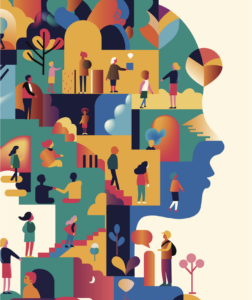
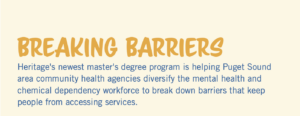
The story of the impact of higher education is frequently told through the lens of students—the personal changes that come through more opportunities, the increased earning potential throughout their lifetimes, and the generational impact as children of college graduates are more likely to earn degrees and access the benefits of doing so. The story that isn’t told as frequently is the community impact made through college attainment.
Spring semester 2024 was the start of a new graduate degree program at Heritage. The Master of Arts in Mental Health Counseling began as a direct response from schools and community health agencies needing more master’s-level practitioners from diverse backgrounds. The stories of the agencies involved, their employees earning their degrees, the people they serve, and the existing need embody the value of higher education to communities at large.
THE NEED IS VAST
Like so many communities large and small across the United States, the greater Seattle region is grappling with a social crisis. Drug addiction, particularly to opioids, is on the rise, with the number of overdoses more than doubling between 2020 and 2023.
Homelessness is up, too. The Unsheltered Point-in-Time Count conducted by King County this year showed the number of homeless individuals rose by 23% in the last two years. Statewide, it’s estimated that more than 1.2 million adults have a mental health condition, with more than half of these people unable to receive treatment.
It’s easy to look at statistics like these and forget that behind the numbers are very real people suffering. They are some of the communities’ most vulnerable individuals in desperate need of assistance. Yet that assistance can be difficult to access. There is a real shortage of service providers. It’s estimated that 2.8 million Washingtonians live in communities without adequate access to mental health care. Plus, internal factors, such as the stigma surrounding mental illness and addiction, cultural beliefs, and inadequate or no health insurance make many people in need of assistance reluctant to seek it. Further complicating the issue is a lack of diversity in the mental health and dependency workforce. Nationally, only 12% of mental health counselors are people of color.
Genell Hennings, director of education enhancement programs at the YMCA in King County, who worked closely with Heritage as the university developed its master’s degree program, explains that this lack of representation is a critical barrier.
“People who are seeking therapy want to see people who look like them, who can identify with them,” she said. “There is a level of trust that comes when we are sitting across from someone who shares our cultural background. When I am coming to you as a Black woman, I don’t want to have to explain my Blackness. A Black provider will be able to identify with me. We are all more comfortable when we are with others who share our cultural norms.”
That trust, she said, is crucial. It’s difficult to build and maintain. If a person seeking treatment has a negative experience, the chances of that individual seeking or accepting help in the future are diminished, as are their chances of conquering their demons.
She further explains that community mental health, which predominately serves people who are low-income and on Medicaid, operates by assigning those seeking services to a provider. This makes building and maintaining that trust much more difficult. The ability to choose a provider that you are comfortable working with is a luxury reserved for those who can pay out of pocket for services or who have private-pay insurance.
RESPONDING TO THE NEED
Donnie Goodman, Executive Director of Behavioral Health Services at the YMCA of Greater Seattle, conceptualized this program in 2008. In 2022, a King County MIDD (Mental Illness & Drug Dependency) funding opportunity presented itself that aligned with the program’s mission of increasing capacity in community behavioral health. Goodman and Hennings worked with leaders from multiple community behavioral health agencies to create this program that focuses on encouraging individuals from historically marginalized groups – specifically people of color, those living with a disability, and members of the LGBTQIA+ and BIPOC community— who are working in mental health and chemical dependency to return to school to earn a master’s degree. The program would pay for the students’ college tuition in exchange for their agreement to remain at their place of employment to provide therapeutic care for at least four years after graduating. At the same time, Heritage was building a new master’s degree program in mental health counseling. The university later received a $6 million grant from the US Department of Education to create a program that would prepare students to become licensed mental health counselor-associates in Washington state and increase the number of mental health professionals working in area school districts. The program was being designed with working professionals in mind, with classes being held synchronously one day a week. Like the YMCA’s developing program, its intent was to prepare underrepresented students to enter the field to diversify their profession.
“We know that our Yakima Valley community, as well as others across the state, are desperately in need of mental health providers. This is especially true for folks who are either uninsured or on state insurance – it’s an equity issue,” said Amy Nusbaum, chair of the Department of Psychology. “Our proposed solution was to create a new and innovative partnership that would address the urgent mental health needs that adversely impact our communities across the state.”
The timing was perfect! The YMCA secured grant funding to support their program for two years and partnered with Heritage to provide the hybrid online master’s degree program. The first cohort of 23 students from six agencies (Catholic Community Services, Center for Human Services, Community House, Therapeutic Health Services, and Transitional Resources YMCA of Greater Seattle) started classes in January 2023. Among them are Deidre Smith, Kenny Smith (no relation to Deidre) and Jungwon Yoon. While each enrolled in the program for different reasons, all three are committed to serving their clients and communities more deeply after graduating.
ON THE FRONT LINE
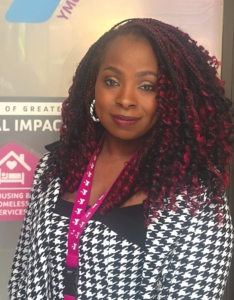
Deidre Smith
Deidre is a substance use disorder professional at the YMCA Social Impact Center in Auburn, Washington. The center provides wraparound services for youth and young adults, including counseling, employment training, educational support, and a shelter, as well as counseling and suicide prevention for individuals of all ages. Smith provides outpatient substance abuse counseling to a caseload of 30-45 people. She decided to enroll in the master’s program to get the credentials she needs to serve her clients’ mental health as well as addiction treatment needs.
“So many of my clients have dual disorders and need mental health therapy along with their dependency treatment. The way my license is now, I have to hand them off to someone else to provide mental health counseling. That creates another barrier for them. Trust is not easy in this field. When I hand them off, they have to build trust with someone else and tell their story to someone else again. I want to be able to serve them holistically,” she said.
Kenny is a co-occurring disorder mental health clinician at Catholic Community Services in Seattle. He works with many homeless individuals through two different shelters and with people living in a permanent supportive housing facility. He knows firsthand what his clients are going through. Their road is one that he walked for many years.
“I’m transparent with my clients. I tell them, ‘I was where you are, man. If I can do this, you can do this.’ It gives them a sense of motivation, I tell them it is a rough road, but if you stick with it, you can make it.
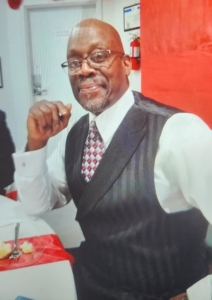
Kenny Smith
“A lot of them are pulling your chain and telling you what they think you want to hear. I know because that is what I used to do. But it is important that we don’t give up on them because, eventually, the one pulling the chain will want to be saved.
“I’m in the master’s degree program because I want the training and the information that comes with it. I have no plans to become a manager. I’m a boots-on-the-ground guy.”
Yoon is a clinical manager working at the Catholic Community Services Matt Talbott Center in the Belltown region of Seattle. The center provides recovery and treatment services for individuals who experience challenges with substance abuse, mental health and homelessness. Her program serves nearly 100 people, a majority of which are engaged in intensive outpatient treatment. “The opposite of addiction isn’t recovery,” she said. “The opposite of addiction is connection.”
Yoon explains that, for many of their clients, the center is their community. Church is held there on Sundays, and community events take place there throughout the year.
“They are very protective of us,” she said. “When there was a week of unrest near us a few years back, our clients surrounded the center and protected it.
“When we see people using substances are sleeping in our back alley, we feed them and give them water, and we tell them, ‘maybe, one day, we will see you at our front door.
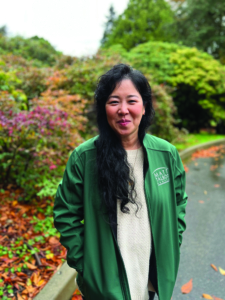
Jungwon Yoon
“For us, it’s not just about getting them to stop taking drugs. It’s about helping them thrive, reunite with their families, and being happy. Everyone deserves to be happy. I think this is why people love our place and have such a sense of ownership.
Yoon’s goal is to bolster further the forms of treatment and services offered by Matt Talbot Center after she earns her master’s degree.
THE IMPACT MULTIPLIED
Deidre, Kenny, and Yoon’s stories demonstrate the bigger picture. They are just three people in a cohort of 23 in this first class alone. This fall, a second cohort of 18 students from an additional five agencies (Asian Counseling and Referral Services, Consejo Counseling Services, Evergreen Health, Vine Maple Place and WAPI Community Services) started the program. Another 25 students are expected next year. In just three years, 66 master’s-level mental health practitioners from diverse backgrounds will be in the field in the King County area working with thousands of vulnerable community members.
On top of these numbers are the Yakima Valley students who are not part of the YMCA grant program. The first cohort of these students started attending classes in person on the Toppenish campus this fall. Future classes will enroll annually, and in two years, a steady stream of graduates will start filling vacancies in area schools and community health agencies where, like their western Washington counterparts, they will work with people with the greatest need for assistance.
This is the impact of higher education on communities! ![]()
